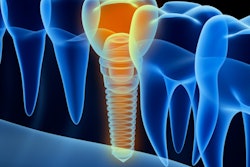
According to the United Nations, 2021-2030 has been proclaimed the "United Nations Decade of Healthy Aging." With already more than 1 billion people age 60 years or older worldwide by 2030, 34 nations, including the U.S., Canada, and nearly all of the European countries, will become super-aging societies, with at least 20% of their population over the age of 65 years old.
Healthy aging entails developing and maintaining a functional ability that enables well-being in older age. Not surprisingly, oral health is key to this. As the World Health Organization states in its report titled "Decade of Healthy Ageing," "Oral health is a key indicator of overall health in older age. Better integration of oral health care into general health care systems is required."
With the help of Dr. Martin Schimmel, a dentist and expert in reconstructive dentistry and gerodontology, we look at how patients can best maintain good oral health in their later years and how oral care can help prevent frailty as a person ages. Below are some do's and don'ts for your older patients.
Don't assume the mouth is only teeth and gums.
 Dr. Lorenz Uebersax.
Dr. Lorenz Uebersax.Most patients know that to keep the oral cavity in good health, it is essential to clean teeth at least twice per day and include interdental cleaning as part of one's daily routine. Dentists and oral hygienists should encourage additional attention to the cleanliness of other vital parts of the mouth -- including the tongue, cheeks, and throat -- which also play an essential role in maintaining oral function.
As part of our regular check-ups with older patients, we should ensure that patients can still perform basic functions such as chewing, swallowing, and speaking to help prevent oral frailty and a decline in oral function. If we fail to do so, their overall health could be impaired by swallowing disorders, malnutrition, and lack of social interaction.
Do counsel patients to include oral health-related quality of life factors into their daily practices.
Building on how to increase oral health-related quality of life, Schimmel says: "I encourage oral care professionals to take on the challenge of maintaining and improving orofacial fitness by helping patients to strengthen the muscles of the mouth to retard oral frailty and making them aware of their role in the prevention of disease through simple exercises and proper oral hygiene. This includes, for example, eating harder food types, like raw vegetables or fruit."
Do collaborate with other healthcare providers/professionals.
Considering a patient's complete medical and dental history and circumstances is fundamental to providing the best possible oral care. The mutual impact of oral health and systemic diseases such as diabetes mellitus has recently gained strong recognition in the field as has the connection between oral health and general frailty.
Hence, involving dentists as a critical element in the early detection and ongoing treatment of those comorbid diseases and impairments benefits all while closer collaboration between health professionals is needed to tackle health challenges in an aging population.
Consequently, access to dental care among older adults is a must if we want to succeed in our vision of healthy aging. More and more seniors are being cared for in nursing homes that lack the resources to provide proper oral care.
Oral health for older patients is neglected in many situations, and regular visits from dentists are as important as those from doctors. Could your practice offer more support to elderly patients in nursing homes? Doctors, caregivers, and families all need to be involved to ensure a good standard of oral care to help maintain patients' general health and independence.
Don't forget to teach the importance of retaining one's teeth.
Removing teeth should be avoided as long as possible as it directly impacts the patient's quality of life and contributes to oral impairment. Instead, supporting and focusing on prevention and the development of treatment protocols to save teeth should be central in modern dentistry.
Schimmel adds, "Retaining our teeth is important, but ensuring their good health is paramount. Caries are a global burden impacting all ages, and root caries are particularly prevalent in later stages of life. Preventing tooth loss throughout the lifetime is the safest way to ensure a better quality of life when frailty appears. But dentists should use prostheses for maintaining or improving masticatory function when necessary."
"If a dental practice prioritizes these behaviors, patients will have a greater advantage in not only maintaining their oral health but also improving their oral function to help prevent overall frailty in later life," Schimmel said.
Dr. Lorenz Uebersax is director of R&D and medical affairs at Sunstar, an international oral health company. He is an expert on oral health and inflammatory and regenerative processes in the human body.
The comments and observations expressed herein do not necessarily reflect the opinions of DrBicuspid.com, nor should they be construed as an endorsement or admonishment of any particular idea, vendor, or organization.



















